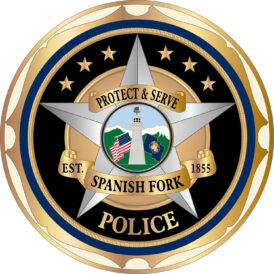BYU linguist dives into history of ‘Utahisms’

Photo Illustration by Jaren Wilkey, BYU Photo
"Spanish Fark" is a common nickname and pronunciation of Spanish Fork that may have Irish roots.Just in time for Pioneer Day, a Brigham Young University linguistics professor has released a book detailing the histories of what Utahns believe to be some of the state’s quirkiest phrases.
David Eddington, author of “Utahisms: Unique Expressions, Inventions, Place Names & More,” is a Utah native who wanted to delve further into the complexities of the state’s language and history.
“I started hearing people say, ‘well in Utah they do this, or they say this, or they say that,'” Eddington said. “It got me thinking, ‘Is that unique or not?’ Or, ‘Is that true or not?'”
While using the term “sluffing school” in place of “skipping school” and “scones” to describe fry bread is unique to the beehive state, that may be the limits of what makes Utah stand out, linguistically.
After surveying 1,700 Utahns about their vocabulary and speech patterns, Eddington discovered that, overall, Utah is not as unique as many of its residents think.
For example, the specific pronunciation, or lack thereof, of the letter “T” in mountain is not unique to Utahns, but is rather the standard American pronunciation of the word. This is thanks to what linguists call a “glottal stop,” which is a sound made by a closure in the throat. However, Utahns are prone to a unique quirk after the glottal stop.
“Pronouncing a ‘T’ a glottal stop is not anything particular to Utah,” Eddington said. “But if I release it through my mouth, it sounds like this, ‘moun-un.’ … That’s what people are calling T-dropping.”
Eddington also found that some of the phrases that Utahns believe sets the state apart actually link the state to other regions vital to its history.
Phrases used by older Utahns — such as “for cute” or “for cool” — are also common in states like Minnesota and Iowa. All three of these states are connected by their large populations of Scandinavian immigrants.
Additionally, the pronunciation of certain Utah town names also bears reference to the state’s early settlers. For example, Eddington believes that the pronunciation of Hurricane as “Hur-ah-kun” is thanks to the English heritage of many of the Utah pioneers. The increasingly rarer pronunciation of Spanish Fork as Spanish “Fark” may be traced to the accents of early Irish settlers.
While some in Utah may be embarrassed of the state’s linguistic quirks, Eddington encourages Utahns to be proud of their dialects and the unique history that influences them.
“People have a sense that there’s one correct way to say things, and as linguists, we realize, ‘Well, that makes as much sense as saying there’s one outfit you wear that is correct,'” Eddington said. “That doesn’t make sense at all.”
Eddington’s “Utahisms: Unique Expressions, Inventions, Place Names & More” will be released this month.



